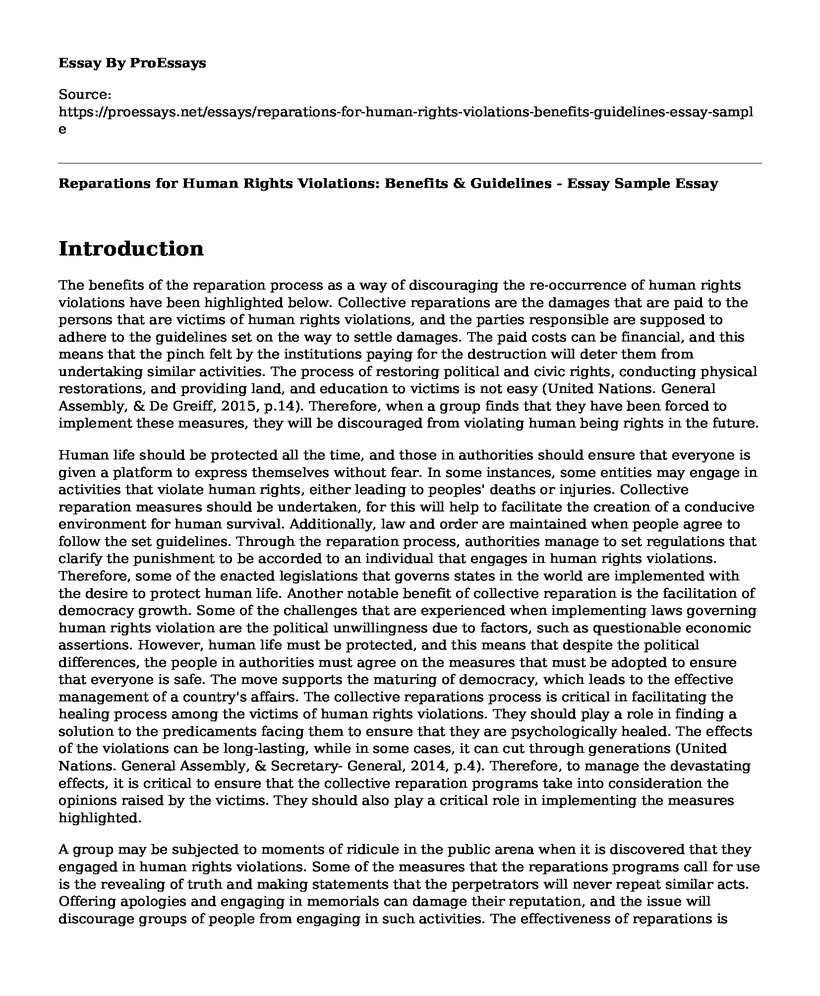Introduction
The benefits of the reparation process as a way of discouraging the re-occurrence of human rights violations have been highlighted below. Collective reparations are the damages that are paid to the persons that are victims of human rights violations, and the parties responsible are supposed to adhere to the guidelines set on the way to settle damages. The paid costs can be financial, and this means that the pinch felt by the institutions paying for the destruction will deter them from undertaking similar activities. The process of restoring political and civic rights, conducting physical restorations, and providing land, and education to victims is not easy (United Nations. General Assembly, & De Greiff, 2015, p.14). Therefore, when a group finds that they have been forced to implement these measures, they will be discouraged from violating human being rights in the future.
Human life should be protected all the time, and those in authorities should ensure that everyone is given a platform to express themselves without fear. In some instances, some entities may engage in activities that violate human rights, either leading to peoples' deaths or injuries. Collective reparation measures should be undertaken, for this will help to facilitate the creation of a conducive environment for human survival. Additionally, law and order are maintained when people agree to follow the set guidelines. Through the reparation process, authorities manage to set regulations that clarify the punishment to be accorded to an individual that engages in human rights violations. Therefore, some of the enacted legislations that governs states in the world are implemented with the desire to protect human life. Another notable benefit of collective reparation is the facilitation of democracy growth. Some of the challenges that are experienced when implementing laws governing human rights violation are the political unwillingness due to factors, such as questionable economic assertions. However, human life must be protected, and this means that despite the political differences, the people in authorities must agree on the measures that must be adopted to ensure that everyone is safe. The move supports the maturing of democracy, which leads to the effective management of a country's affairs. The collective reparations process is critical in facilitating the healing process among the victims of human rights violations. They should play a role in finding a solution to the predicaments facing them to ensure that they are psychologically healed. The effects of the violations can be long-lasting, while in some cases, it can cut through generations (United Nations. General Assembly, & Secretary- General, 2014, p.4). Therefore, to manage the devastating effects, it is critical to ensure that the collective reparation programs take into consideration the opinions raised by the victims. They should also play a critical role in implementing the measures highlighted.
A group may be subjected to moments of ridicule in the public arena when it is discovered that they engaged in human rights violations. Some of the measures that the reparations programs call for use is the revealing of truth and making statements that the perpetrators will never repeat similar acts. Offering apologies and engaging in memorials can damage their reputation, and the issue will discourage groups of people from engaging in such activities. The effectiveness of reparations is realized when it is combined with transitional justice programs, such as prosecutions (United Nations. General Assembly, & Secretary-General, 2014, p. 2). Getting convicted of human rights violations and spending time in prison is a move that will guarantee that there will be no recurrence of conflicts that will adversely affect people's rights. One such court case that involves violation of human rights is the Filartiga v. Pena-Irala.
References
United Nations. General Assembly, & De Greiff, P. (2015). Report of the Special Rapporteur on the promotion of truth, justice, reparation, and guarantees of non-recurrence. United Nations General Assembly.
United Nations. General Assembly, & Secretary- General. (2014). Promotion of truth, justice, reparation, and guarantees of non-recurrence. United Nations General Assembly.
Cite this page
Reparations for Human Rights Violations: Benefits & Guidelines - Essay Sample. (2023, Mar 09). Retrieved from https://proessays.net/essays/reparations-for-human-rights-violations-benefits-guidelines-essay-sample
If you are the original author of this essay and no longer wish to have it published on the ProEssays website, please click below to request its removal:
- Adnan vs. Baltimore: Killing in Self-Defense
- Future Direction of Criminology Essay
- Coalition for Human Immigration Rights of Los Angeles Paper Example
- Strict Product Liability: Calles v. Scripto-Tokai Corp. Case Paper Example
- Current Events Which Are Happening in Line With the 8th Amendment in the USA
- Essay Sample on Gun Control: Do We Need to Take Further Action?
- Essay on 3 Strategies to Prevent Violence: Hardening the Target, Blaming the Perpetrator, Blaming Society







